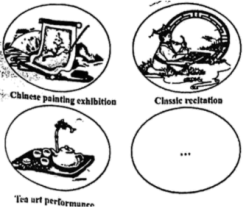
注意:
1. 写作词数应为80左右;
2. 请按如下格式在答题卡的相应位置作答。
Dear teachers and fellow students,
___________________________________________________________________________________________________________________________________________________________________________________________________________________________________________________________________________________________________________________________________________________________________________________________________________________________________________________________________________________________
1. 本周学习时间变更及原因;
2. 本周学习内容:制作包子(steamed stuffed bun);
3. 课前准备:面粉、猪肉及蔬菜。
注意:
1. 词数100左右;
2 .可以适当增加细节,以使行文连贯。
____________________________________________________________________________________________________________________________________________________________________________________________________________________________________________________________________________________________________________________________________________________________________________________________________________________________________________________________________________________________________________________________________________________________________________________________________________________________________________________________________
1. What’s the percentage of people spending their vacation at home now?
| A.40%. | B.50%. | C.90%. |
| A.The mountains are more beautiful than before. |
| B.The seaside has lost its attractions. |
| C.They are eager to get close to nature. |
| A.A plan. | B.A report. | C.An experience. |
1. Where is the little house?
| A.Near a fruit farm. |
| B.Three blocks from the ocean. |
| C.On the rainy side of the island. |
| A.There’s no TV. |
| B.It’s too cold there. |
| C.There’s no air conditioner. |
| A.It doesn’t have a dryer. |
| B.It provides toothbrushes. |
| C.It has a big swimming pool. |
| A.Pack for a trip. |
| B.Make a phone call. |
| C.Go grocery shopping. |
5 . Facial expressions carry meaning that is determined by situations and relationships. For example, in American culture (文化) the smile is in general an expression of pleasure. Yet it also has other uses. A woman’s smile at a police officer does not carry the same meaning as the smile she gives to a young child. A smile may show love or politeness. It can also hide true feelings. It often causes confusion (困惑) across cultures. For example, many people in Russia consider smiling at strangers in public to be unusual and even improper. Yet many Americans smile freely at strangers in public places (although this is less common in big cities).Some Russians believe that Americans smile in the wrong places; some Americans believe that Russians don’t smile enough. In Southeast Asian cultures, a smile is frequently used to cover painful feelings. Vietnamese people may tell a sad story but end the story with a smile.
Our faces show emotions (情感), but we should not attempt to "read" people from another culture as we would "read" someone from our own culture. The fact that members of one culture do not express their emotions as openly as do members of another does not mean that they do not experience emotions.
Rather, there are cultural differences in the amount of facial expressions permitted. For example, in public and in formal situations many Japanese do not show their emotions as freely as Americans do. When with friends, Japanese and Americans seem to show their emotions similarly.
It is difficult to generalize about Americans and facial expressiveness because of personal and cultural differences in the United States. People from certain cultural backgrounds in the United States seem to be more facially expressive than others. The key is to try not to judge people whose ways of showing emotion are different. If we judge according to our own cultural habits, we may make the mistake of "reading" the other person incorrectly.
1. What does the smile usually mean in America?| A.Love. | B.Politeness. |
| C.Joy. | D.Thankfulness. |
| A.show friendliness to strangers |
| B.be used to hide true feelings |
| C.be used in the wrong places |
| D.show personal habits |
| A.Learn about their relations with others. |
| B.Understand their cultural backgrounds. |
| C.Find out about their past experience. |
| D.Figure out what they will do next. |
| A.Cultural Differences |
| B.Smiles and Relationship |
| C.Facial Expressiveness |
| D.Habits and Emotions |



